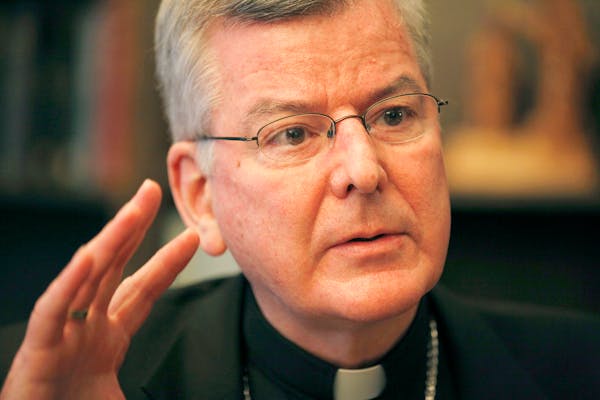Archbishop John Nienstedt declared he will not resign as head of the Archdiocese of St. Paul and Minneapolis, and insisted the archdiocese has turned the corner on the clergy abuse scandal and is now "in a much better place."
In a series of media interviews Wednesday — his first in six years — and in a column published Thursday in the Catholic Spirit newspaper, Nienstedt apologized for the "distractions" of the controversy and acknowledged he had lost the confidence of some followers — but that he was working to earn that back.
In his 20-minute interview with the Star Tribune, a poised Nienstedt calmly took on questions on clergy sex abuse, the financial stability of the church and his own sexuality.
The archbishop, under growing criticism to step down because of how the archdiocese handled priests who sexually abused children, said he would leave only if the papal nuncio, the pope's representative in the United States, "took action" on his leadership.
"And I would have to be convinced that my effectiveness to lead the archdiocese was nil," he said. "And I don't believe it is. I have strong pockets of support. And other pockets that aren't supportive. I'm working on that."
Nienstedt's rare move into the spotlight came after lawyers for the archdiocese submitted a report to the church body on their investigation into allegations that he had been involved in misconduct with adults.
The report is under review, church officials say.
Nienstedt said he believed that the investigation involved five allegations of sexual impropriety, including from the time he served in the Detroit Archdiocese in the 1990s.
The allegations were made by priests and seminarians.
The archbishop denied that he was a homosexual or engaged in homosexual acts.
"I'm not gay," he said. "And I'm not anti-gay."
When he led the charge for a constitutional amendment to ban same-sex marriage in Minnesota in 2012, he said he was only arguing that marriage should be between a man and a woman.
"It wasn't to put down people with same-sex attractions," he said.
When asked why Catholic priests and seminarians alleged he had same-sex attraction, Nienstedt responded, "I have no idea."
"But I made a lot of enemies by the stands I've taken in Detroit and here," he said. "I assume it feeds into that."
Nienstedt didn't know when the investigation would be complete.
However, when it is, he said it would be sent to the papal nuncio in Washington, D.C., and a "statement will be made." He didn't know if the report would be made public.
Financial strain
Nienstedt acknowledged concern over the financial future of the archdiocese, specifically the repercussions of the lifting of the statute of limitations on older child sex abuse complaints. Since the statute was lifted in May, 21 lawsuits have been filed against the archdiocese, he said.
"We're looking at all kinds of possibilities that we may have to consider in the future," he said, adding that bankruptcy "could be one of them."
"But I've spoken with bishop friends, and they've advised me that should be the last choice," he said.
The archdiocese has begun holding small-group meetings with wealthy donors, he said.
Meanwhile, Nienstedt said he was speaking publicly this week to draw attention to the archdiocese's new "momentum" in combating clergy sex abuse.
He said the archdiocese investigators have reviewed 3,000 priest files, implemented new monitoring programs to track priests who have abused, completed all criminal background reports on clergy and staff and made new efforts to reach out to victims.
It's also implementing the recommendations of an archdiocese task force, released this year, which noted "serious shortcomings" in the archdiocese's policies and protocol for handling abusers.
"I'm working hard to re-establish the confidence of people who have lost confidence," Nienstedt said. "We're in a much better place."
Reaction mixed
The Rev. Stephen O'Gara, former pastor at Assumption Church in downtown St. Paul, said that if Nienstedt's goal is to win back public support, he should have met in person with groups of lay people, priests, donors and other constituents of the archdiocese instead of just publishing his stance in the archdiocesan newspaper.
"He has spent all his credibility, and he continues to hide behind the printed word," said O'Gara, who will retire in August.
Jim Frey, a prominent donor to Catholic institutions in the Twin Cities, said Nienstedt should step down "for the good of the church."
While it appears that the archdiocese's most recent round of fundraising has been successful, he said donations could have been higher given the buoyant economic environment.
"Hope and healing are on hold for us as long as Archbishop Nienstedt" stays in his position, Frey said.
Bridget Kluesner, a daily mass attendee at St. John's Catholic Church of Little Canada, applauded Nienstedt for staying put.
"He should not resign," said Kluesner. "We don't run our church on popular opinion."
Kluesner said Nienstedt's job is to "lead the sheep" in good times and in bad, "and unfortunately he is in some bad times."
She believes some attacks against him have come from people who are resentful of his staunch opposition to gay marriage.
Nienstedt's announcements follow a series of calls for his resignation from both clergy and lay Catholics, as well as the Star Tribune editorial page and the New York Times.
The archbishop repeated that he has never knowingly covered up clergy sexual abuse.
"I have, however, been too trusting of our internal process and not as hands-on as I could have been in matters of priest misconduct," he wrote in the Catholic Spirit.
In the end, Nienstedt said in the interview, he still has work to do.
"I'm only 67 years old,'' he said. "I have a lot of energy left in me.''
Star Tribune staff writer Tony Kennedy contributed to this report.
Jean Hopfensperger • 612-673-4511

In Grand Rapids, Itasca Pride is planning its first event, but there is already pushback
One person shot at YMCA in Coon Rapids

BCA says man pointed pistol-style BB gun at officers before he was shot in Woodbury

Former diversity worker sues University of Minnesota after firing over swastika photo

